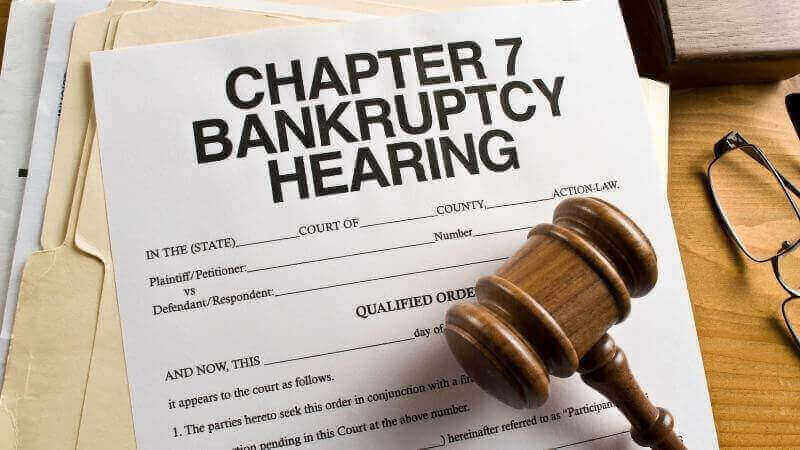Bankruptcy is a legal procedure where a company or a person fails to pay its debts. The bankruptcy process begins with a petition that can be filed by creditors or debtors according to the case which is more common. The debtor’s properties are all evaluated and recorded, and the properties may be utilized to pay off a share of the debt.
Bankruptcy is a legal method that allows people or organizations to be free of their obligations while also giving creditors the option to be paid. The United States Bankruptcy Code sets out the rules, which are processed in the federal court. There are several varieties of bankruptcy, each of which is designated by a chapter of the United States Bankruptcy Code. Bankruptcy might provide you with a new beginning, but it will remain on your credit file for several years and make borrowing tough in the upcoming future.
Bankruptcy helps people or companies in starting over by dismissing debts that are plainly unaffordable and permitting creditors to receive some type of remuneration, based on the liquidation resources that are obtainable. In concept, the opportunity to submit for bankruptcy promotes the general economy by enabling people and businesses a second chance at credit and by giving creditors a share of debt repayments. The debtor gets released of the debt incurred previous to submitting for bankruptcy when the bankruptcy processes are successfully completed.
In the United States, all bankruptcy matters are processed by the federal court. A bankruptcy judge makes all the decisions in federal bankruptcy issues, including if a debtor is qualified to apply and whether their debt should be erased. A trustee, an officer designated by the Department of Justice’s U. S. Trustee Programme to defend the debtor’s estates in bankruptcy proceedings, is mostly responsible for the administration of the litigation. Unless a creditor raises an issue in the proceedings, there is often such little real interaction between the debtor and the court.
The basic things of bankruptcy in Arizona
The U.S Supreme court States enacted federal bankruptcy provisions to help those who are deeply in debt get a fresh start. The bankruptcy clearance frees debtors from obligation for some debts and prevents creditors from pursuing any court action to recover that debt in order to develop new possibilities. As a result, the Bankruptcy Code provides for various sorts of bankruptcy issues (referred to as chapters).
The Bankruptcy Code, included in Title 11 of the U.s. Code is a unified federal statute that handles bankruptcy cases. There are one or even more judicial districts for each state. Every one of those districts also has its own bankruptcy proceedings. Furthermore, a bankruptcy judge is a judicial official. The judge decides all matters pertaining to a federal bankruptcy issue.
Furthermore, a person applying has little contact with the judge. A creditors’ conference, also known as a 341 creditors’ conference, is a statutory hearing in which a debtor comes before the judge. A court is used to conduct administration business as part of the bankruptcy procedure. A trustee may be appointed to oversee a case.
Everyone who is thinking about filing for bankruptcy or seeking debt relief needs to know how much it will cost. Most potential bankruptcy clients are short on cash and still want to know how much it will take to file and how much it will cost to represent them. So, what is the expense of filing for bankruptcy? Anticipated fees, such as registration fees, lawyers fees, and other miscellaneous charges, are outlined on this page.

Filing fees as well as other incidental fees of low cost in Arizona
To begin, all bankruptcy applicants with predominantly consumer debts need to take a credit counseling course before declaring and a personal financial management course before receiving clearance. Each course ranges in price from $15 to $25. Likewise, several bankruptcy lawyers will check the report of credit to confirm that every one of your creditors is listed on the petition. This might cost somewhere between $25 to $50.
All filers must submit a filing fee to the bankruptcy proceedings. The filing charge for a Chapter 7 bankruptcy is $335, while a Chapter 13 bankruptcy filing charge is $310. If you have financial difficulties, you may well be able to fulfill your filing fees in installments throughout a few months.
The cost of a lawyer in Arizona varies
Before we get into what lawyers’ fees in Arizona are like, it is crucial to remember that the whole cost of bankruptcy can’t be calculated without taking into account the long-term implications. The success percentages for pro se filers drop considerably, particularly for Chapter 13 cases. Lawyers are frequently able to obtain a release on behalf of their clients, saving them money and preventing major problems down the road. Effective bankruptcy counsel is sometimes said to pay for itself in strategic functioning and preventing complications that might occur during the proceedings.
Clients looking to save a few 100 dollars on the front end might end up paying many times that amount in the long run if they hire the wrong lawyers. “The bitterness of low quality persists well after the pleasure of cheap cost is forgotten,” as Benjamin Franklin famously stated, and this is especially true of bankruptcy. As a result, charges might not be the only factor to consider when selecting a lawyer. But let’s pretend you already know all of that and are just curious about what to aspire to.
In Arizona, typical chapter 7 bankruptcy legal expenses
Even though a current Ninth Circuit judgment now permits bankruptcy lawyers to take payment options in Chapter 7 cases, numerous cases can now advance with such little down payments. For an experienced bankruptcy lawyer in Phoenix, the expense of declaring bankruptcy and the most usual range of costs that can be seen for Chapter 7 files range between $1,800 to $2,500. The intricacy of your issue and the lawyer’s quality or expert reputation are the two main elements that influence pricing. You can get decent representation for as little as $1,200 in basic “no asset” instances (no non-exempt possessions).
It is frequently (but not always) found that clients who pay just under $1,200 for legal services are compromising quality, and they often do this at their own risk. Similarly, even in complicated matters with skilled, skilled counsel, the majority of people don’t need to pay $3,000 or so for a Chapter 7 release. A typical Chapter 7 filing costs around $2,000 and $2,400, depending on a variety of criteria. No one is in a price war. Everyone competes solely on the value of the representation, which is commensurate with the price.

Lawyers of chapter 13 bankruptcy in the State of Arizona
In a Chapter 13 bankruptcy, you can negotiate with your lawyer to construct a payment plan that costs a Chapter 13 trustee your expendable cash over a 3 to 5 period. For effective representation, a Chapter 13 lawyer’s costs in Arizona typically range from around $3,500 to $5,500. The state of Arizona charges a $4,500 “no-look” charge, which is deemed presumptively fair. Any sums greater than $4,500 must be authorized by the court of bankruptcy.
The excellent news is that you won’t have to pay the entire sum right away. In most cases, you would just need to pay the registration cost and a small retainer to the lawyer upfront. The trustee, who gets your monthly plan contribution budget allocation prepared by you and your lawyer, might settle the outstanding balance of lawyers’ fees through the Chapter 13 program. Considering the flexibility offered in the Chapter 13 context, the expense of filing bankruptcy in the Chapter 13 scenario is reasonable.
Final thoughts on the cost of bankruptcy in Arizona
It is almost never a smart idea to employ an inexpensive bankruptcy attorney because poor representation can and frequently does end up costing you more money in the long run. Without losing sight of the overall picture, don’t be lured by offers of “low-cost bankruptcy” or “cheap bankruptcy.” The costs of ineffective representation should be factored into the expense of filing bankruptcy. However, you must be aware of the fair variety of rates so that you really can be cost-conscious and avoid overspending for services at a time when the budget is tight.
An expert bankruptcy lawyer can help you preserve your possessions, prevent or resolve potential complaints from creditors or the trustees, and reduce the likelihood of issues. Similarly, having professional representation increases your chances of success significantly. In the vast majority of circumstances, hiring a competent lawyer is well worth the investment. If you want your case to be resolved soon without any prior complications, you might rethink your decision of hiring the least expensive lawyer in your case in the state of Arizona.
